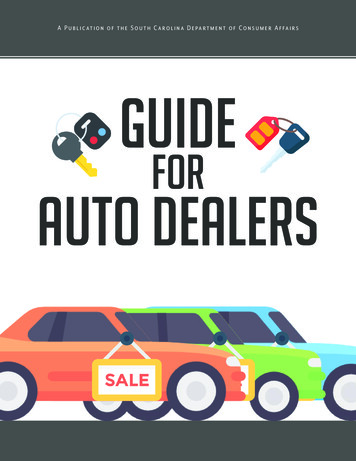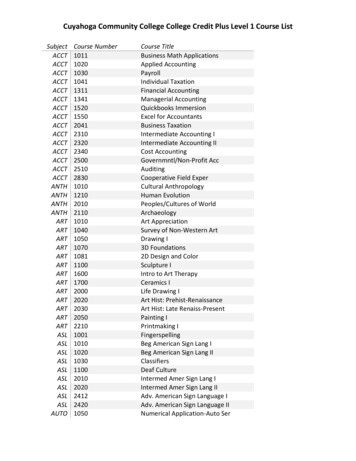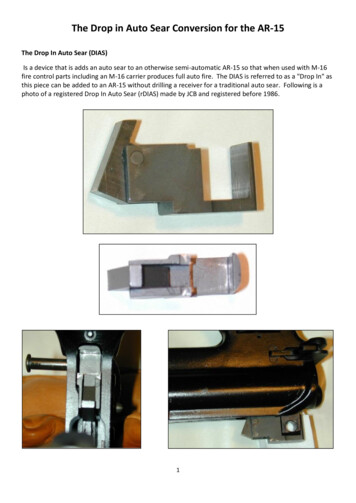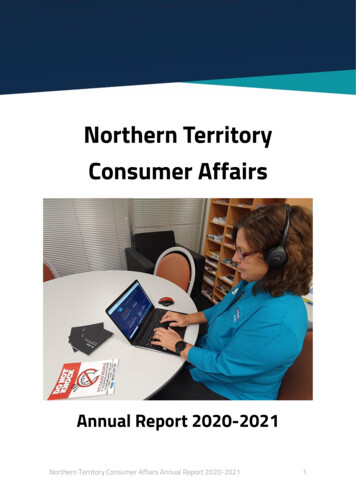
Transcription
A P u b l i c at i o n o f t h e S o u t h C a r o l i n a D e p a r t m e n t o f C o n s u m e r A f f a i r sguideFORAUTO DEALERS
The Buyers GuideTable of ContentsThe Buyers Guide.3Advertising.4-5TILA and Recurring Issues.6SCDCA Required Filings.7Debt Collection.8Lemon Law & GAP.9Protecting Consumer Information.10Resources.11The Federal Trade Commission’s (FTC) Used Car Rule requires dealers to post a Buyers Guide in everyused car offered for sale, including at auctions open to consumers.Make sure you arefollowing the rules Be sure to complete a Buyers Guide properly foreach used vehicle you put up for sale. The Buyers Guide must be easily seen and displayedon both sides of the used vehicle. You may hangit from the rearview mirror, post it on windows orunder the windshield wipers. You may remove theguide for a test drive, but must replace it once thetest drive is over. You cannot put the Buyers Guide inthe glove box, trunk or under a seat. When a sale is conducted in Spanish, the BuyersGuide must also be in Spanish. If your guide has a line for the buyer’s signature, youmust include a required disclosure for the consumerto acknowledge its receipt. The law requires your sales contract to include aspecific disclosure explaining that the guide is a partof the contract.What the guidetells consumers If the vehicle has a warranty or will be sold “as is.” What percentage of repair costs the dealer will payunder the warranty. That oral promises are hard to enforce and to getthem in writing. To keep the Buyers Guide for reference after the saleis complete. The major mechanical and electrical systems onthe car, as well as some of the major problems thatconsumers should look out for. To request that the vehicle be inspected by anindependent mechanic before the transaction iscomplete. To get a vehicle history report and to check for safetyrecalls, visit ftc.gov/usedcars for information. Give the consumer the Buyers Guide or a copy of it.Ensure that it states the final negotiated warrantycoverage. When offering a written warranty be sure thatit complies with federal law and is available forexamination by potential buyers. The Buyers Guide isNOT sufficient to convey the actual written warranty.They MUST be separate documents.This document is intended to provide general guidance regarding laws applicable to motor vehicle dealers and is not meant toserve as a substitute for reading the various laws discussed, seeking legal counsel, or otherwise requesting Department guidanceand/or interpretations on the laws it administers and enforces.SC Department of Consumer AffairsNONCOMPLIANCEDealers who violate the Used Car Rule may be subjectto penalties up to 46,517 per violation (subject tochange). For more information, head to ftc.gov.www.consumer.sc.gov (800) 922-15943
What DEALERS SHOULD know about ADVERTISINGThe following advertisement methods are subject to regulation by SCDCA: Verbal/oral ads Written ads Graphic/picture adsAdvertisements published via any and all advertising media are subject to regulation. This includes: Radio Television Magazines Newspaper Internet Shopping GuidesADVERTISEMENTSMUSTADVERTISEMENTSMUST NOT Include the name of the motor vehicle dealermaking the offer. Be false, deceptive, misleading, or misrepresenta vehicle. If a price is quoted: Use statements that guarantee the value or rangeof value for trade-in vehicles.it must include any closing fee, andthe ad must clearly identify that vehicle’s make,model and year and if it is new or used. Use the term “free” when the purchase or otherconsideration is required to obtain the supposed“free” item or service. If a rebate is advertised for the sale OR lease ofa vehicle, it must be one that is available to themajority of the buying public. Imply that the dealer has a special arrangementwith the manufacturer that is not available atsimilar dealerships. When offering discounts on the sale or lease ofa new vehicle, discounts must be deductedfrom the MSRP of the vehicle as stated on theMonroney sticker. If the discount is not deductedfrom the MSRP, the pre-discounted price as well asthe discounted price should be displayed. Offer a rebate as part of the advertised priceof the vehicle that is not available to themajority of the buying public. The amount of therebate may be listed as an additional incentive tothose who qualify. No qualification such as “with trade” or “with downpayment” may be used. Comply with Federal Truth in Lending Act andRegulation Z when making credit advertisements. Comply with Federal Consumer Leasing Act andRegulation M when making lease advertisements.Dealers must sell a vehicle for theadvertised price, with three exceptions:The ad clearly and conspicuously discloses that aconsumer must present or mention the ad to getthat price.The dealer posts a coupon that must bepresented to receive a discounted purchase price.The ad states that the price and terms are good onlyfor a specific period of time and such time has passed.4 SC Department of Consumer AffairsCLEAR AND CONSPICUOUSLanguage in Advertising The statement, representation or disclosure regarding a vehicle for saleor lease must be easily noticed and understood. All language and terms, including abbreviations, must be used inaccordance with their common usage and meaning. When utilizing print ads, eight point type or larger must be used inall disclosures. In broadcast ads, any spoken statements must be understandable in paceand volume. Any visual statements must be displayed so that the averageviewer can easily read it. It must equal the size of twenty scan lines andappear continuously for at least five seconds.Violation of the rules can result in fines of up to 10,000.Auto dealers are responsible for the content and form of their ads. Advertising agencies or other third parties willbe considered agents of the auto dealer and the dealer will be held accountable for failure to comply with rules.pENALTIES FOR NONCOMPLiaNCESCDCA may issue the following penalties to dealers violating the advertising rules.Each notice received by the dealer for a related offense serves as an additional violation.1st Violation: Written warning.2nd Violation within 6 months: 500 fine.3rd Violation within 6 months: Up to 1,000 fine.4th Violation within 6 months: Up to 10,000 fine.If SCDCA finds a new violation (i.e., one not related to a prior offense) or if six months haspassed since an initial warning notice was issued, the process starts over again witha written warning.Continued violations may be considered grounds for revocation, suspension, andnon-renewal of a dealer license.www.consumer.sc.gov (800) 922-15945
Tila & recurring issuesTruth IN LENDINg The Truth in Lending Act (TILA) requires creditors to provide meaningful and accuratedisclosures of credit terms. Auto advertisements promoting closed-end credit transactions must disclose clearlyand conspicuously credit information, including:terms of repayment,the actual cost of credit as a dollar amount and as an annual percentage rate (using that term).recurring issues Including expense line items that are not permissible in the calculationto determine the closing fee. Example: Car detailing, fuel expense,delivery charges. Including compensation for employee duties that are not related to theclosing process. Including the total costs of dealer operating expenses as opposed to onlyclosing related costs.Example: IT systems, office supplies, shredding and retention expense.6 SC Department of Consumer AffairsA credit sale is when a business sells an item to a consumer to pay over time (i.e., retailinstallment contract). This includes when a consumer completes finance paperwork at thedealership. A consumer loan on the other hand is when a business gives a consumer moneyso the consumer can purchase an item from another business.Auto dealers that intend to impose an annual finance charge in excess of 18% APR on credit salesmust file a Maximum Rate Schedule with the SCDCA and post it at the dealership. Auto dealersthat don’t file for a rate above 18% are limited to imposing an APR of 18% or below.Advertising ViolationsClosing Fee ApplicationAuto dealers that make consumer credit sales or consumer leases in SC must file CreditGrantor Notifications with the SCDCA unless the annual gross sales for the business are lessthan 150,000.MAX RATEHere are the most common recurring issues that SCDCA sees: Specifically saying a closing fee is excluded from an advertised pricenormally ranks in the top three categories of violations. Other recurring issues include not disclosing if a vehicle is new or used andfailing to disclose proper terms according to the Consumer Leasing Act.CREDIT GRANTORAuto Dealers Do Not Make Loansamount/percent of down payment, Over a third of the issues identified generally deal with TILA violations. Themajority involve a failure to disclose required terms after a triggering term ismade. Not using the term “annual percentage rate” or “APR” is also acommon violation.SCDCA REQUIRED FILINGSHow to File with SCDCA:Registered Creditor filingsmust be renewed annuallybefore January 31st.Click “Online Filing: LicensureGateway” under the”Business Resources” headerfor links to filing instructions,flowcharts and videotutorials to help make sureyour filings are accurate.SCDCA posts maximum ratesand closing fees under the“Licensee Lookup” tab on ourwebsite.CLOSING FEESA closing fee is defined as a fee charged for all administrative and financial work needed to transferthe motor vehicle to the consumer, person or entity including, but not limited to: Compliance with all state, federal and lender requirements, includingthe protection of the consumer’s private personal information, Preparation and retrieval of documents, Related records retention and storage costs.If an auto dealer intends to charge a closing fee on a motor vehicle sales contract they must: Pay a 25 registration fee annually to SCDCA. If the closing fee is 225 or less, it is automaticallyapproved. Over 225: The Department may review the amount of the closing fee for reasonableness. Include the closing fee in the advertised price of the motor vehicle, disclose it on the sales contract,and display it in a conspicuous location in the dealership.Dealers are NOT required to charge a closing fee. If they choose to do so, it is illegal totell a consumer that the fee is required or otherwise non-negotiable.www.consumer.sc.gov (800) 922-15947
dEBT COLLECTION & CHARGESdebt collection &repossession proceduresWhen a consumer misses a required payment, the auto dealer must issue a “right to cure”notice before repossessing the vehicle. The auto dealer may not send the notice until the consumer has been delinquent for at least 10 days. After issuance of the notice, the consumer has 20 days to make the missed payment. If the consumer makes the payment within the allotted 20 days, it is as though thedefault never occurred. However, if it is a closed-end transaction, and the consumerdefaults again, a right to cure notice is not required. An auto dealer CANNOT require the consumer to waive their right to receive the right tocure notice. When hiring a third party repossession company to retrieve property, the auto dealer isresponsible for that company’s actions.Visit our “Business Education & Tools” webpage for (1) a flowchart to help youdetermine if a notice of a right to cure is required and (2) guidance regarding thetiming and content requirements for a notice.lemon law & GAPthe lemon lawA “lemon” is:A new private passenger vehicle (i.e., car, truck, van, or motorcycle);With a defect that impairs its use, safety or will lower its market value substantially;And which the manufacturer cannot repair in a reasonable time.Reasonable time is considered to be three repair attempts for the same defect or 30 ormore days out of service for repairs. The 30 days do not have to be consecutive.Vehicles are not covered if the defects are due to the owner’s abuse, neglect or unauthorized alteration of thevehicle; or if the defect(s) don’t show up within the first 12,000 miles or 12 months, whichever comes first.guaranteed asset protectionGuaranteed Asset Protection (GAP) may be sold in South Carolina as a debt cancellation contract.GAP is not insurance. Here are some key rules to know and follow: The purchase of a GAP waiver is optional. A dealer cannot require a consumer to buy it inorder to get credit, to obtain certain terms of credit or to purchase the related vehicle.A dealer cannot offer GAP if:Limits on fees & chargesThe Consumer Protection Code limits fees and charges for creditors. Here are some examples:The maximum late fee permitted is 5% of the installment payment not to exceed 21.00 (Thisamount is subject to change July 1 of every even-numbered year. Check SCDCA’s website for themost up-to-date info.)Prepayment penalties on sales or loans are prohibited.A transaction fee imposed by the DMV as part of the Electronic Lien and Titling (ELT) programis an official fee that can be assessed by a creditor as a permissible additional charge. A feeimposed by a third party to facilitate an ELT transaction must be absorbed by the creditor orincluded in the finance charge.8 SC Department of Consumer AffairsThe loan is for an amount less than 4,000 or a duration less than 12 months;The vehicle does not qualify for or conflicts with any restrictions or limitations of theGAP product;The amount financed is less than 80% of the manufacturer suggested retail price for anew vehicle or the average retail value for a used vehicle (i.e., NADA, Bluebook); orR VIOL ATESIF A DEALE L AW, THETHE GAP OID ANDVWAIVER IS UND MUSTFERLLUAFTO THEBE ISSUED ER.CONSUMThey do not reasonably believe the borrower will benefit in the event of a covered total loss.GAP is a permissible additional charge and:Dealers must allow at least 30 days to cancel the GAP waiver without any penalties.Must remain a part of the finance agreement upon its assignment, sale or transfer by a creditor.Dealers must report the sale of and forward funds received on all waivers to the designated party, ifany, as prescribed in an applicable administrative services agreement, contractual liability policy, otherinsurance policy, or other specified program documents.www.consumer.sc.gov (800) 922-15949
ResourcesPROTECTING CONSUMER INFORECORDS DISPOSALSTATE LAW: Businesses must make consumer’spersonal identifying information (PII)unreadable or undecipherable whendisposing of records. Businesses must also remove PII fromhardware, storage media and otheritems before selling, transferring orotherwise disposing of the item.STATE AGENCIESFEDERAL LAW: Any business or individual who usesa consumer report for businesspurposes is subject to the FederalDisposal Rule. The Rule requires thatreasonable measures beimplemented to ensure the properdisposal of information in consumerreports and records and prevent theunauthorized access to and use ofthe information.SC Department of Motor Vehicleswww.scdmvonline.com or (803) 896-5000SC Department of Consumer Affairs Dealer Licensing Titles Gramm-Leach-Bliley ActThis Act and the Safeguards Rule put safety requirements on financial institutions (including auto dealers) withregards to consumers’ personal information.Requirements include:1. Implement an information security program containing safeguards addressing access controls, data inventoryand classification, encryption, secure development practices, authentication, information disposal procedures,change management, testing, and incident response.2. Designate a single qualified individual to oversee your information security program and report periodically tothe board of directors or governing body.SECURITY BREACH NOTIFICATIONAuto dealers must notify South Carolina consumers in the event of a breach.A security breach is the unauthorized access to, and acquisition of:Items containing PII not rendered unusable through encryptionor other method;Where the illegal use of this information has occurred or islikely to occur.For more information on yourresponsibilities under stateprivacy laws, visit our websitefor a free copy of Identity Theftand the Law.(see contact information on back page)Debt Collection/RepossessionConsumer Credit Sales, Loans or LeasesAutomobile AdvertisingLemon LawFinance Charges, Closing Fees and GAPRecords Disposal and Security BreachesFEDERAL AGENCIESThe Federal Trade CommissionConsumer Financial Protection Bureauwww.consumerfinance.gov or (855) 411-CFPB Regulation of Larger “Buy Here,Pay Here” Dealerswww.ftc.gov or 1 (877) FTC -HELPRecords DisposalSafeguards RuleGramm-Leach-Bliley ActBuyers Guide/Used Car Sales RuleHolder in Due Course RuleCredit Practices RuleTruth in Lending ActConsumer Leasing ActEqual Credit Opportunity ActMagnuson-Moss Warranty ActRegulation of Smaller “Buy Here,Pay Here” DealersThe disclosure of the breach must be made within a reasonable time fromits discovery. If a breach affects more than 1,000 SC residents at one time, thebusiness must also notify SCDCA and the major credit reporting companies.10SC Department of Consumer Affairswww.consumer.sc.gov (800) 922-159411
South Carolina Department of Consumer Affairs, 2022.This brochure may be copied or reproduced for non-commercial,educational purposes, so long as no changes or modifications are made.Find the latest scam alerts and news here.twitter.com/scdcaCheck out our YouTube channel.youtube.com/scdcatv293 Greystone Blvd., Ste. 400PO Box 5757 Columbia, SC 29250(800) 922-1594 www.consumer.sc.gov- February 2022 -Look here for updates & educational rs
SC Department of Consumer Affairs www.consumer.sc.gov (800) 922-1594 3 . the protection of the consumer's private personal information, . A credit sale is when a business sells an item to a consumer to pay over time (i.e., retail installment contract). This includes when a consumer completes finance paperwork at the










